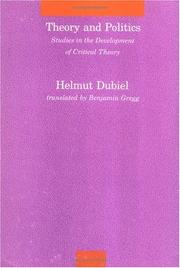| Listing 1 - 8 of 8 |
Sort by
|

ISBN: 0791486591 9780791486597 0791457818 0791457826 9780791457818 Year: 2003 Publisher: Albany State University of New York Press
Abstract | Keywords | Export | Availability | Bookmark
 Loading...
Loading...Choose an application
- Reference Manager
- EndNote
- RefWorks (Direct export to RefWorks)
Are social equity, political fairness, and legal justice possible within a liberal political order, even if norms are indeterminate? The modern world is distinguished by both its complexity and the absence of a single theory, principle, or tradition with the authority to constrain us. Coping in Politics with Indeterminate Norms demonstrates that while moral validity is relative rather than absolute, and cultural meanings local rather than universal, social integration and democratic politics are still attainable goals. Benjamin Gregg fashions a theory that combines proceduralism with pragmatism—an "enlightened localism"—that adjudicates among competing normative commitments and interpretations using local criteria in the absence of universal standards. The theory is applied to three empirical domains: social criticism, public policy, and law and morality.
Social justice. --- Social norms. --- Social policy --- Justice, Administration of --- Justice and politics --- National planning --- State planning --- Economic policy --- Family policy --- Social history --- Folkways --- Norms, Social --- Rules, Social --- Social rules --- Manners and customs --- Social control --- Equality --- Justice --- Moral and ethical aspects. --- Political aspects.
Book
ISBN: 1107230322 1139210092 128048540X 9786613580382 1139223070 1139218271 1139215183 1139224794 1139221361 1139059629 9781139224796 9781139059626 9781139221368 6613580384 9781280485404 9781107015937 1107015936 9781107612945 1107612942 Year: 2013 Publisher: Cambridge: Cambridge university press,
Abstract | Keywords | Export | Availability | Bookmark
 Loading...
Loading...Choose an application
- Reference Manager
- EndNote
- RefWorks (Direct export to RefWorks)
Most conceptions of human rights rely on metaphysical or theological assumptions that construe them as possible only as something imposed from outside existing communities. Most people, in other words, presume that human rights come from nature, God, or the United Nations. This book argues that reliance on such putative sources actually undermines human rights. Benjamin Gregg envisions an alternative; he sees human rights as locally developed, freely embraced, and indigenously valid. Human rights, he posits, can be created by the average, ordinary people to whom they are addressed, and that they are valid only if embraced by those to whom they would apply. To view human rights in this manner is to increase the chances and opportunities that more people across the globe will come to embrace them.
Human rights --- Political science. --- Administration --- Civil government --- Commonwealth, The --- Government --- Political theory --- Political thought --- Politics --- Science, Political --- Social sciences --- State, The --- Basic rights --- Civil rights (International law) --- Rights, Human --- Rights of man --- Human security --- Transitional justice --- Truth commissions --- Social aspects. --- Law and legislation --- mensenrechten --- 34 --- Social aspects --- Social Sciences --- Political Science --- Human rights - Social aspects
Book
ISBN: 1108841163 1108893139 1108896510 1108897525 Year: 2022 Publisher: Cambridge : Cambridge University Press,
Abstract | Keywords | Export | Availability | Bookmark
 Loading...
Loading...Choose an application
- Reference Manager
- EndNote
- RefWorks (Direct export to RefWorks)
Human genetic enhancement, examined from the standpoint of the new field of political bioethics, displaces the age-old question of truth: What is human nature? This book displaces that question with another: What kind of human nature should humans want to create for themselves? To answer that question, this book answers two others: What constraints should limit the applications of rapidly developing biotechnologies? What could possibly form the basis for corresponding public policy in a democratic society? Benjamin Gregg focuses on the distinctly political dimensions of human nature, where politics refers to competition among competing values on which to base public policy, legislation, and political culture. This book offers citizens of democratic communities a broad perspective on how they together might best approach urgent questions of how to deal with the socially and morally challenging potential for human genetic engineering.
Medical genetics --- Genetic engineering --- Bioethics --- POLITICAL SCIENCE / History & Theory --- Moral and ethical aspects. --- Law and legislation. --- Government policy. --- Political aspects. --- Biology --- Biomedical ethics --- Life sciences --- Life sciences ethics --- Science --- Genetic engineering and state --- Genetic engineering policy --- State and genetic engineering --- Science and state --- Medical laws and legislation --- Moral and ethical aspects
Book
ISBN: 9781108893138 9781108841160 9781108789714 1108789714 Year: 2022 Publisher: Cambridge Cambridge University Press
Abstract | Keywords | Export | Availability | Bookmark
 Loading...
Loading...Choose an application
- Reference Manager
- EndNote
- RefWorks (Direct export to RefWorks)
Human genetic enhancement, examined from the standpoint of the new field of political bioethics, displaces the age-old question of truth: What is human nature? This book displaces that question with another: What kind of human nature should humans want to create for themselves? To answer that question, this book answers two others: What constraints should limit the applications of rapidly developing biotechnologies? What could possibly form the basis for corresponding public policy in a democratic society? Benjamin Gregg focuses on the distinctly political dimensions of human nature, where politics refers to competition among competing values on which to base public policy, legislation, and political culture. This book offers citizens of democratic communities a broad perspective on how they together might best approach urgent questions of how to deal with the socially and morally challenging potential for human genetic engineering
Dissertation
Year: 1985 Publisher: [S.l. : s.n.],
Abstract | Keywords | Export | Availability | Bookmark
 Loading...
Loading...Choose an application
- Reference Manager
- EndNote
- RefWorks (Direct export to RefWorks)
Multi
ISBN: 9780812292671 9780812248050 0812248058 Year: 2016 Publisher: Philadelphia: University of Pennsylvania press,
Abstract | Keywords | Export | Availability | Bookmark
 Loading...
Loading...Choose an application
- Reference Manager
- EndNote
- RefWorks (Direct export to RefWorks)
The nation state operates on a logic of exclusion: no state can offer citizenship and legal rights to all comers. From the logic of exclusion a state derives its sovereign power. Yet this exclusivity undermines the project of advancing human rights globally. That project operates on a logic of inclusion: all people, regardless of citizenship status or territorial location, would everywhere be recognized as bearers of human rights. In practice, human rights are afforded, if at all, then only to citizens of those few states that sometimes regard human rights as moral necessities of domestic commitments—or for states that find that stance politically expedient for the momentThis discouraging reality in the first decades of the twenty-first century prompts the question: What political arrangement might better conduce the local embrace and enduring practice of human rights? In The Human Rights State, Benjamin Gregg challenges the conviction that the nation state can only have a zero-sum relationship with human rights: national sovereignty is possible or human rights are possible, but not both, not in the same place, at the same time. He argues that the human rights project would be more effective if established and enforced at local levels as locally valid norms, and from there encouraged to expand outward toward overlaps with other locally established and enforced conceptions of human rights grown in their own local soils.Proposing a metaphorical human rights state that operates within or alongside a nation state, Gregg describes networks of activists that encourage local political and legal systems to generate domestic obligations to enforce human rights. Geographic boundaries and national sovereignties would remain intact but diminished to the extent necessary to extend human rights to all persons, without reservation, across national borders, by rendering human rights an integral aspect of the nation state's constitution.
Political sociology --- Politics --- Human Rights

ISBN: 0822330814 0822330938 0822384523 1283064448 9786613064448 Year: 2003 Publisher: Duke University Press
Abstract | Keywords | Export | Availability | Bookmark
 Loading...
Loading...Choose an application
- Reference Manager
- EndNote
- RefWorks (Direct export to RefWorks)

ISBN: 0262040808 9780262040808 Year: 1985 Publisher: Cambridge, Mass.: MIT Press,
Abstract | Keywords | Export | Availability | Bookmark
 Loading...
Loading...Choose an application
- Reference Manager
- EndNote
- RefWorks (Direct export to RefWorks)
Frankfurt school of sociology --- Critical theory --- Knowledge, Sociology of --- History --- Horkheimer, Max, --- -Knowledge, Sociology of --- #SBIB:316.21H21 --- Knowledge, Theory of (Sociology) --- Sociology of knowledge --- Communication --- Knowledge, Theory of --- Public opinion --- Sociology --- Social epistemology --- Critical theory (Sociology) --- Frankfurt school --- Frankfurt sociologists --- Schools of sociology --- Marxian school of sociology --- Critical social theory --- Critical theory (Philosophy) --- Negative philosophy --- Criticism (Philosophy) --- Philosophy, Modern --- Rationalism --- Socialism --- Theoretische sociologie: kritische theorie en de Frankfurter Schule --- Horkheimer, Max --- Critical theory. --- Knowledge, Sociology of. --- History. --- Frankfurt school of sociology - Germany (West) - History --- Horkheimer, Max, - 1895-1973 - Kritische Theorie
| Listing 1 - 8 of 8 |
Sort by
|

 Search
Search Feedback
Feedback About UniCat
About UniCat  Help
Help News
News